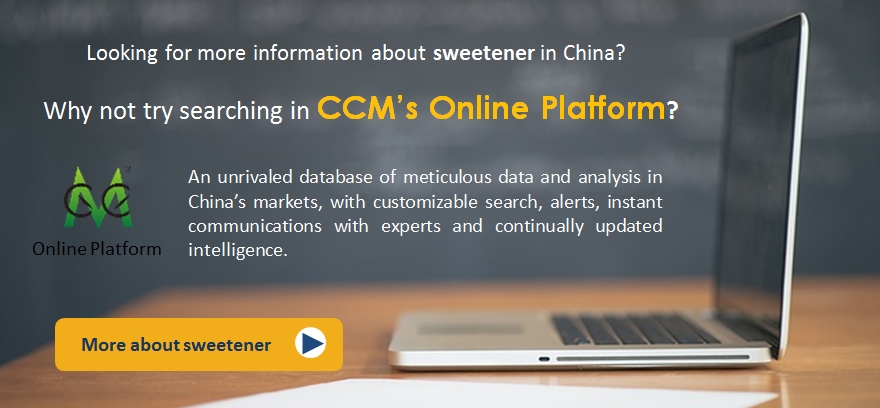The Chinese government
is expected to enhance the regulation and supervision on the L(+)-arabinose business, to solve the “untypical” overcapacity problem, according to Tang
Yilin, president of Shengquan Group. Specifically, the dull sale of
L(+)-arabinose is China can be mainly attributed to the hindered market
exploitation.
On
2 March, 2016, the annual “Two Session” of China's top legislative body and top
national advisory body opened officially. The central government, was expected
by Tang Yilin, president of Ji’nan Shengquan Group Share-holding Co., Ltd.
(Shengquan Group), a representative of the National People’s Congress, to
enhance the regulation and supervision on the L(+)-arabinose and suchlike
businesses, so as to solve the “untypical” overcapacity problem of
L(+)-arabinose business.
Just like other functional sugars, L(+)-arabinose functions to promote the
gastrointestinal motility. More importantly, it regulates the blood sugar level
by restraining the small intestines from absorbing sugar: if sugar contains
about 3.5% of L(+)-arabinose, about 70% of sugar will not be adsorbed by body,
according to the Chinese Centre for Disease Control and Prevention (CDC) and
Beijing Research Institute for Nutritional Resources. Now Japan’s Ministry of
Health, Labour and Welfare has already listed this functional sugar into
“Special Healthcare Food Additive for Blood Sugar Regulation”.
In 2008, L(+)-arabinose was approved by China officially as “New Resource
Food”. From then on, the enterprises, including Shengquan Group and Thomson
Biotech (Xiamen) PTE Co., Ltd. (Thomson Biotech), pioneered in co-producing
L(+)-arabinose and xylose based on corn cob, which broke the monopoly by
foreign enterprises. According to CCM’s research, there are 12 L(+)-arabinose
producers in China, of which 5 have 300 t/a+ production capacity. They are:
-
Shandong
Xieli Biological Technology Co., Ltd. - 2,000 t/a
-
Shengquan
Group - 1,500 t/a
-
Shandong
Futaste Pharmaceutical Co., Ltd. - 1,000 t/a
-
Thomson
Biotech - 500 t/a
-
Zhejiang
Huakang Pharmaceutical Co., Ltd. - 300 t/a

However, China’s L(+)-arabinose business is facing “untypical” overcapacity
problem. “Now most of producers are suspending production for the dull sale,”
stated Tang Yilin.
Take table sugar for example. Now the consumption of table sugar is about
500,000 tonnes, ideally demanding 17,500 tonnes of L(+)-arabinose. In fact, the
total consumption reaches only about 100 tonnes now. The weak market demand has
led to the overcapacity and high stock.
Accordingly,
now the market exploitation for L(+)-arabinose is being obstructed.
The L(+)-arabinose business, listed in “New Resource Food”, needs government’s
guidance and support, to establish partnership with downstream industries such
as food, beverage, condiment, healthcare products and bio-pharmaceuticals.
However, the government has yet to take measures. In consideration of
production cost, downstream enterprises are inclining to cheap high intensity
sweetener (HIS), which shocks the L(+)-arabinose market. According to CCM’s
price monitoring, the market price of food grade L(+)-arabinose is about
USD21,412/t (RMB140/kg), whilst that of cyclamate (the most widely applied HIS
in domestic market) is USD2,141/t (RMB14/kg).
Domestic consumers know little about L(+)-arabinose. This forces enterprises to
input huge time and capital in improving publicity. “The input is up to
USD611.76-764.70 million (RMB4-5 billion), if we intend to make it known to all
Chinese consumers, about 1 billion people, at least 6 promotions for each one.
This is far beyond our capability,” said Tang Yilin.
In order to deal with the hindered market exploitation problem for
L(+)-arabinose, the Chinese government is expected to:
-
Promote
the development of L(+)-arabinose business together with sugar business,
to “force” more downstream enterprises to use L(+)-arabinose and expand
demand
-
Issue
policies to financially support L(+)-arabinose producers and pilot
application enterprises, so as to reduce the production costs and increase
the consumption
-
Strengthen
the promotion of L(+)-arabinose and suchlike functional sugars, to help
people establish a common view that “no health of the whole nation means
no universal well-off”
-
Set up
functional sugar industry alliance, to play a guiding role in sustainable
and healthy development

About CCM:
CCM is the leading
market intelligence provider for China’s agriculture, chemicals, food
& ingredients and life science markets. Founded in 2001, CCM offers a
range of data and content solutions, from price and trade data to
industry newsletters and customized market research reports. Our clients
include Monsanto, DuPont, Shell, Bayer, and Syngenta.
For more information about CCM, please visit www.cnchemicals.com or get in touch with us directly by emailing econtact@cnchemicals.com or calling +86-20-37616606.
Tag: sweetener, L(+)-arabinose